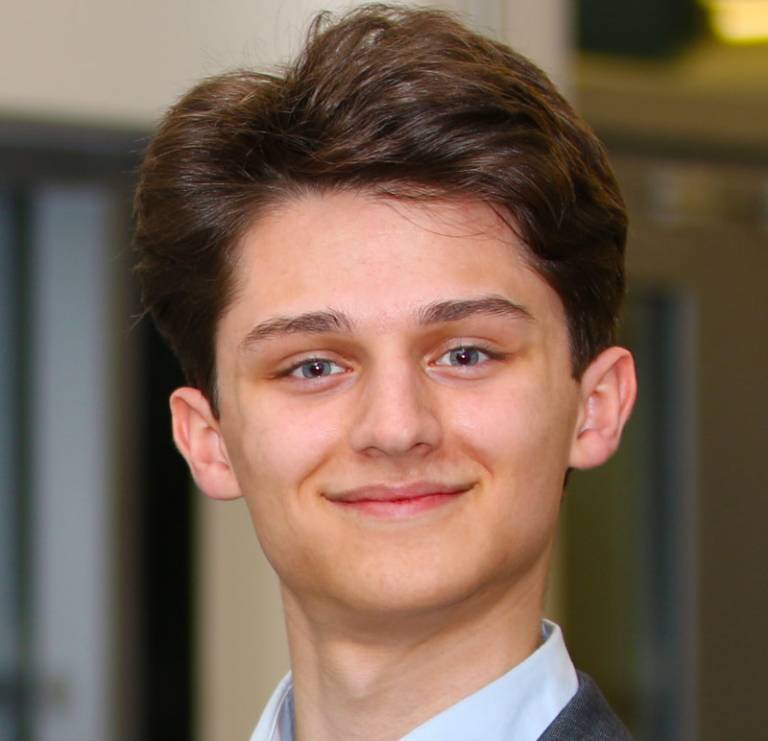A Student's Perspective on the Provost's UCL 2034 talk
13 October 2017
By Student Journalist Robert Vilkelis Professor Michael Arthur, UCL's President & Provost, took to the Darwin Lecture Theatre's podium on 12 October, kicking off this year's series of
 ucl.ac.uk/calendar/tab:lunch_hour_lectures/" target="_self">Lunch Time Lectures with an upbeat summary of UCL's ongoing progress towards to the achievement of the UCL 2034 twenty-year education strategy.
ucl.ac.uk/calendar/tab:lunch_hour_lectures/" target="_self">Lunch Time Lectures with an upbeat summary of UCL's ongoing progress towards to the achievement of the UCL 2034 twenty-year education strategy.The Provost's Talk
Arthur's talk focused on summarising the progress in fulfilling each principle theme of UCL 2034 to a packed lecture theatre - though few students were to be seen among the roles of predominantly academic and administrative staff.
Arthur shared a warm enthusiasm in his talk, proudly discussing what UCL has achieved in the last year in relationship to home and international student recruitment, teaching recognition and the development of the UCL Olympic Park campus, which he described as, "absolutely, fundamentally important for the future of our university."
As a student who will have "BSc from UCL" written on my CV, the Provost's talk is encouraging. We achieved Silver in the Teaching Excellence Framework; we doubled our research income since 2014; we have a 4.5% budget surplus.
Yet, as a student who is presently studying said BSc, the Provost's talk leaves me missing the big picture of what's going on in my university. His talk consisted purely of information: data, metrics and statistics.
He has shared the bottom line - but the world I live in, and the world so many of us live in, is the world "before the bottom line". Arthur's talk reassures me that big things are happening for, in and around UCL - yet, in my day-to-day life, I don't feel this motion. How can so much move above, yet so much feel still below?
Arthur went into great detail sharing results. What was missing from the talk was a sense of WHAT is really going on at the level of classroom and campus, HOW it's affected, is affecting and stands to affect the everyday lives of students and staff, and what the big picture of UCL as a living community looks like.
What I would like to hear more of
What would I have liked to hear more of? I want to hear the Provost share what's really working within and around UCL, and what's really not working.
"When I look around UCL I think there are parts that are absolutely brilliant," Arthur shared in the Q&A, "but there are other parts where that doesn't happen as well. That patchiness is something that troubles me."
That "patchiness" is what I want to hear about - because these are the challenges that we as students, teachers and researchers are authentically in touch with, and they are the ones I want to help solve.
How can I, as a student, contribute to the realisation of UCL's vision? How can we, as the Psychology and Language Sciences 2016-19 cohort? How can we, as a division? As a department? As a faculty? That's what I want to know: the future I can create, not the past I can observe.
The heart of UCL 2034 doesn't exist in letters nor numbers: it lives in conversation.
What difference can you make?
Perhaps the most important thing I took away from the Provost's talk is what he shared with me on our way out.
"What's exciting about UCL, is this history that it's open to all," he shares with me as we make way out for the next lecture's students.
"And, what I love about UCL, and intermittently worry about," he continues, "is the way in which it encourages being disruptive - that 'Benthamite' streak. I think that's very unique."
"That's what we need to capture."
Diversity is who we are as an institution; disruptiveness is what we need to capture, to channel and to create.
Michael Arthur? This is the energy I want to see take the podium next time; the energy I want to stir and shape the classroom and the campus beyond.
In the meantime, for the rest of us? Let's make good on living up to our reputation.
 Close
Close

